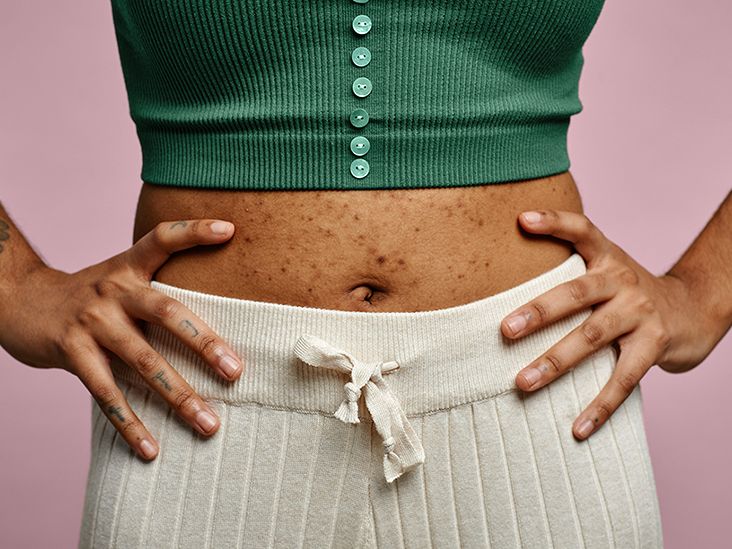These symptoms may signal an underlying condition and the need to see a dermatologist.
Your skin is your most visible organ, so it’s easy to notice when something seems off. It’s normal to experience some skin issues from time to time, like itchiness, breakouts, or ingrown hairs. But when these skin symptoms stick around, it could be a sign that something more serious is going on.
Many of these skin issues get better with the right at-home remedies or changes in your skin care routine. For example, if dryness pops up when Old Man Winter comes along, slathering on a more intense moisturizer may help.
But if skin symptoms don’t go away with a little self-care — or they return frequently — a chronic skin condition might be the culprit. However, just because you have a lasting symptom or two doesn’t necessarily mean you have a chronic health issue.
Here are the symptoms you should watch for and what they might mean. And if they don’t improve, consider checking in with a dermatologist for a proper diagnosis and a plan of action.
If you wish you had cat claws to satisfy your skin itch, you could be dealing with eczema. Eczema is an umbrella term for several conditions that impact the skin, with atopic dermatitis being the most common.
With most forms of eczema, your skin may show signs of inflammation, such as:
- itchiness
- red, gray, brown, or purple skin
- a rash
- intense dryness
These symptoms may flare up occasionally and then go into periods of remission, where your skin isn’t as irritated.
Allergies can also lead to itchiness. For example, if you’re allergic to a skin care ingredient, a fabric type, a pet, or another allergen, your skin might react as a way to tell you to avoid this trigger.
Ongoing or regular periods of itchiness are a reason to see a dermatologist.
A rash can affect the skin in various ways, including:
- red, gray, brown, or purple patches
- itchiness
- raised bumps
- hives (urticaria)
A one-off or temporary rash might result from friction or chafing from a new outfit item. It could also be a heat rash when sweat gets trapped in skinfolds or bodily creases.
A persistent rash could be a sign of eczema or allergies. However, different types of rashes can be a sign of other things. For example, a butterfly-shaped (malar) rash across the face is a common sign of an autoimmune disease known as lupus.
If you frequently experience skin rashes, talk with a dermatologist to help you get to the bottom of the issue.
- cold weather
- dry weather
- dry indoor heat
- super-hot baths or showers
- bathing too frequently
- chlorine exposure from swimming
- irritation from ingredients in skin care or soaps
- sun exposure
But if your skin is so dry it makes you want to bathe in a vat of thick moisturizer, it could be a sign of psoriasis.
Psoriasis is an inflammatory skin condition potentially caused by an overactive immune system. It can lead to dry, cracked, or scaling skin. In fact, psoriasis often involves a buildup of scales or plaques on areas like the elbows or knees — though they can occur anywhere.
Psoriasis and eczema are different conditions, but they have overlapping symptoms that mimic each other. So if you experience these symptoms, it’s important to see a dermatologist to identify and treat the underlying cause.
Changes in skin color — including red, brown, gray, or purple patches of skin — can be a sign of various skin issues, including eczema, psoriasis, or allergies. But it can also be a sign of rosacea.
Rosacea typically involves persistent redness that looks like a sunburn or blushing. It may also lead to skin thickening.
The good news? Rosacea is highly treatable. So working with a dermatologist can help you address it.
No one is immune from developing the occasional pimple or ingrown hair. But sometimes, skin bumps can be a sign that something else is going on.
Acne is one of the most common skin conditions that could bring skin bumps like pimples.
Hidradenitis suppurativa (HS) is another condition that causes painful, boil-like lumps to form underneath the skin. These bumps can turn into pus-filled pockets that may connect via tunnels. HS typically shows up in areas of high friction or where skin meets skin, such as the armpits or groin.
Other types of skin bumps may include ingrown hairs, which can get infected and turn into folliculitis.
Talk with a dermatologist to help you address any bothersome skin bumps you may experience.
Common moles are growths that develop when pigment cells (melanocytes) grow in clusters. The average adult has between 10 to 40 common moles.
An irregular mole, also known as a dysplastic nevus, is a type of mole that looks different from your common moles. If you have a dysplastic nevus (or several), schedule regular skin checks with a dermatologist to look for anything suspicious. Be sure to mention any changes in:
- color
- size
- shape
- texture
- oozing
- bleeding
These types of changes could be a sign of a form of skin cancer such as melanoma, which occurs in melanocytes. Melanoma can develop anywhere, including on normal-looking skin, a common mole, or a dysplastic nevus.
Skin symptoms — like rashes, bumps, discoloration, dryness, or itchiness — may come and go. But if symptoms stick around or return frequently, consider seeing a dermatologist for an evaluation. Your skin may be telling you that there’s an underlying issue that needs to be addressed.
A dermatologist can provide a proper diagnosis and treatment plan to help reduce, or, in some cases, resolve your skin symptoms. If you don’t currently have a dermatologist, your primary care physician or nurse practitioner can refer you to one.

